Mar 16, 2021
What you need to know for the Canadian Mixed Doubles Championship
Traditional four-person curling has left the Calgary bubble for the next little while as the 2021 Home Hardware Canadian Mixed Doubles Curling Championship kicks off on Thursday on TSN. Here’s what you need to know for the third event of the curling bubble.
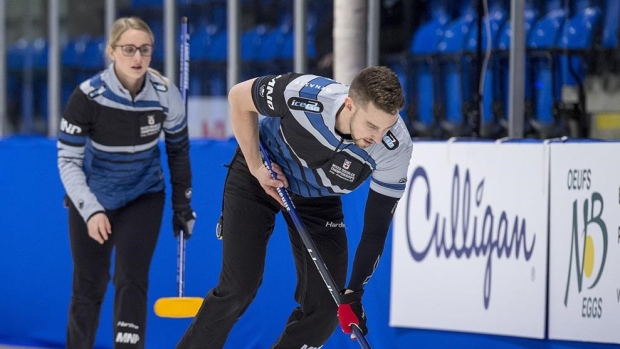
Traditional four-person curling has left the Calgary bubble for the next little while as the 2021 Home Hardware Canadian Mixed Doubles Curling Championship kicks off this week.
The action runs March 18-25 from WinSport Arena at Canada Olympic Park.
For the full broadcast schedule, click HERE.
Last year’s event was cancelled due to the COVID-19 global pandemic, meaning 2019 champions in Jocelyn Peterman and Brett Gallant are looking to defend their title in Calgary.
The Canadian Mixed Doubles Canadian Championship is relatively new with the inaugural event taking place in 2013. Quebec’s Isabelle Neron and Robert Desjardins were the last duo standing in Leduc, Alta., that year.
Over the years, more and more notable names have gradually given the discipline a try, with the sport taking off in 2018 following the addition of mixed doubles at the Olympics. John Morris and Kaitlyn Lawes won gold for Canada at the Winter Games in South Korea and now just about every big name in curling competes in mixed doubles with the golden carrot of Olympic glory dangling above.
Here’s what you need to know for this year’s Canadian Mixed Doubles Championship.
What are the rules?
Here’s a quick refresher on the rules for mixed doubles.
- Each game consists of eight ends.
- The winner of the draw to the button will earn the ‘option’ for the first end. The team with the ‘option’ can decide to have their stationary stone positioned as a guard or in the house behind the button. If they elect the house, the opponent’s stone will be set up as a guard, and vice-versa. They will have the hammer if they elect to have their stone in the house. The ‘option’ will move to the other team after scoring in an end.
- Each team throws five stones per end.
- The curler who delivers the first stone of the end must deliver the last stone while his/her teammate will throw the three stones in between.
- No stone can be removed until after the third stone of an end.
- The Power Play: The Power Play position can be used once per game by each team. The in-house stone will be moved from the back of the four-foot on the centre line to the tee-line, splitting the eight-foot and 12-foot. The centre guard will be moved to guard the new placement of the in-house stone.
What’s the format?
Thirty-five teams will compete in five pools of seven teams each.
Each duo will play a six-game round robin against the teams in their pool with the top 12 overall teams making the playoffs. The top four will get a first-round bye while the fifth to 12th-ranked tandems (5 vs. 12, 6 vs. 11, 7 vs. 10, 8 vs. 9) will play each other in the Round of 12. The winners will join the top four teams to complete the Round of Eight.
The qualifying round will pare down the final eight teams to the final four. From there, a page seeding draw will commence to determine the rankings for the page playoff. The winners will play in the 1 vs. 2 game while the losers will battle in the 3 vs. 4 game.
The semi-final and championship game will be played on Thursday, March 25.
What’s at stake?
The winners will potentially represent Canada at the 2021 World Mixed Doubles Curling Championship. The World Curling Federation has yet to announce a time and place for that event. At the world championships, the top seven countries will directly qualify for the 2022 Winter Olympics in Beijing.
A total purse of $150,000 is up for grabs as well with the first-place team earning $50,000. The second-placed duo gets $30,000 while the bronze medalists will go home with $20,000.
Lastly, the top two unqualified teams will clinch spots for the 2022 Canadian Mixed Doubles Olympic Trails. Click HERE for more details on the qualification process for the Olympic trials.
Who’s playing?
The 35-team field includes representation from the 14 provincial and territorial curling associations as well as 14 teams from the Canadian Mixed Doubles Rankings (based on results from March 15, 2019-March 15, 2020).
The final seven tandems are comprised of teams who planned to play together this season but were unable to do so because of the pandemic. Curling Canada selected them based on CTRS points accumulated during the 2019-20 campaign.
Here’s a closer look at the field.
POOL A
Jocelyn Peterman/Brett Gallant (CMDR)
Kadriana Sahaidak/Colton Lott (CMDR)
Clancy Grandy/Patrick Janssen (CMDR)
Joanne Courtney/Darren Moulding (CTRS)
Melissa Adams/Alex Robichaud (New Brunswick)
Brittney Tran/Aaron Sluchinski (Alberta)
Angela Dale/Peter Van Strien (Nunavut)

The duo of Jocelyn Peterman and Brett Gallant, who are engaged, are the defending champs coming in and one of the best mixed doubles teams on the planet. They won the Canadian Mixed Doubles Championship for the first time in 2016 after posting a perfect 10-0 record and won again in 2019 – the last time the event was played – by beating Nancy Martin and Tyrel Griffith in the final. They would go on to lose to Sweden’s Anna Hasselborg and Oskar Eriksson at the world championship. Both are used to the bubble environment by now after competing at the Scotties Tournament of Hearts and Tim Hortons Brier with Jennifer Jones and Brad Gushue.
Other teams to watch out for include sweeping extraordinaire Joanne Courtney and her partner Darren Moulding, who is fresh off winning the first Brier Tankard of his career with Alberta’s Team Brendan Bottcher. Courtney won gold at the 2017 mixed doubles nationals after a perfect 10-0 performance with then-partner Reid Carruthers before claiming silver at the worlds.
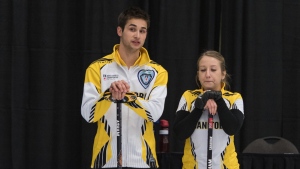
Couple Kadriana Sahaidak and Colton Lott of Manitoba also have the potential to do some damage as they’ve reached the podium at this event twice, winning bronze in 2019 and silver in 2018, posting a total record of 17-3. In the third leg of the 2019 Curling World Cup, the partnership won gold after topping Norway’s Kristin Skaslien and Thomas Ulsrud in the final.
POOL B
Jennifer Jones/Brent Laing (CMDR)
Kim Tuck/Wayne Tuck (CMDR)
Émilie Desjardins/Robert Desjardins (CMDR)
Kerri Einarson/Brad Gushue (CTRS)
Laurie St-Georges/Félix Asselin (Quebec)
Lauren Wasylkiw/Shane Konings (Ontario)
Bayly Scoffin/Wade Scoffin (Yukon)
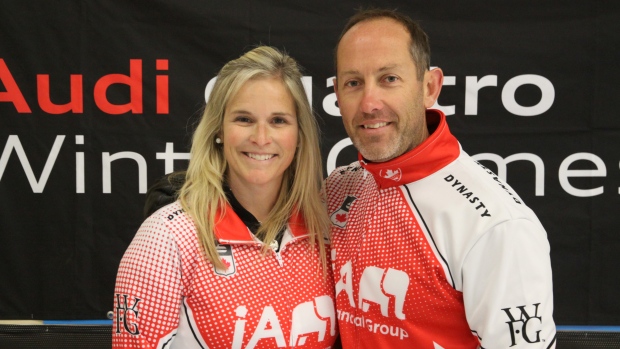
This will be the fourth mixed doubles championship for the husband-and-wife team of Jennifer Jones and Brent Laing. Both have had great success in traditional curling, but they have yet to reach the top of the podium in this discipline, getting as far as the semifinals in 2017. The pair did win a mixed doubles bonspiel in Waterloo, Ont., earlier this season.
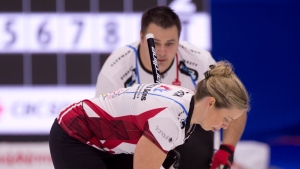
Ontario’s Wayne and Kim Tuck, another married curling couple, are mixed doubles vets as this will be their seventh Canadian Mixed Doubles Championship together. They posted a 5-3 record in 2019 in Fredericton, N.B., and won gold in 2014. The pair have also played in mixed curling together.
Kerri Einarson and Brad Gushue, two of the best skips in the game today, have joined forces for mixed doubles this season. Einarson has never played mixed doubles on the national stage while Gushue was a win away from wearing the Maple Leaf at the 2018 Pyeongchang Olympics with then-partner Val Sweeting. The duo lost in the Canadian trials final to Lawes and Morris.
Curling rock star Laurie St-Georges and her boyfriend Felix Asselin are returning to the curling bubble for mixed doubles as the Quebec champions. St-Georges, 23, made headlines for her strong play and big personality in her rookie Scotties while Asselin, 26, posted a 4-4 record at the Brier as a second for Michael Fournier. This will be their first national championship as teammates. Asselin went 1-6 in 2017 with Jill Routledge.
Robert Desjardins, who won the first Canadian Mixed Doubles Championship back in 2013, is back for a seventh time and the fifth playing with his daughter, Emilie. Their best showing was in 2018 at 5-3.
POOL C
Nancy Martin/Tyrel Griffith (CMDR)
Laura Walker/Kirk Muyres (CMDR)
Chaelynn Kitz/Kyler Kleibrink (CMDR)
Briane Meilleur/Mark Nichols (CTRS)
Selena Njegovan/Reid Carruthers (CTRS)
Stephanie Jackson-Baier/Corey Chester (British Columbia)
Lauren MacFadyen/Alex MacFadyen (Prince Edward Island)

Nancy Martin and Tyrel Griffith are the top-ranked team in Pool C after losing in the 2019 final to Peterman and Gallant. This will be the eighth Canadian Mixed Doubles Curling Championship for Martin (most all-time) and the second for Griffith. Martin also lost in the final of the first mixed doubles championship in 2013, playing with then-partner Dustin Kalthoff. Martin, who has played in all seven Canadian Mixed Doubles Championships, competed in her first Scotties with Saskatchewan’s Sherry Anderson last month.
Laura Walker and Kirk Muyres are another duo with plenty of success in this discipline in the past. They won gold in 2018 after edging Sahaidak and Lott in the final, 8-7, and won the bronze medal at worlds a short time later. They finished with another bronze at the 2019 nationals and also won the first leg of the 2018 Curling World Cup in Suzhou, China. Before teaming up with Muyres, Walker played with her husband Geoff Walker and captured the silver medal at the mixed doubles nationals in 2016.
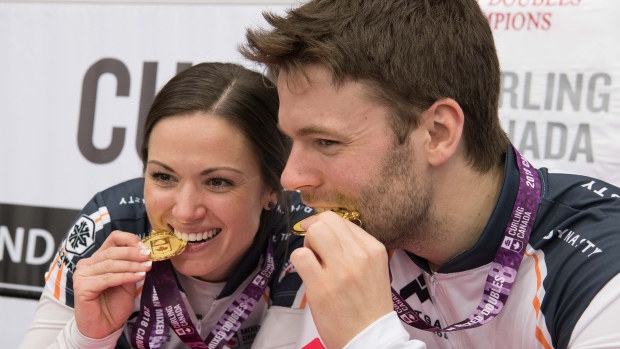
Other notable teams in Pool C include Briane Meilleur and Mark Nichols as well as Selena Njegovan and Reid Carruthers. Carruthers won the 2017 Canadian Mixed Doubles Championship with then-teammate Joanne Courtney. They finished with the silver medal at the world championships that year.
POOL D
Shannon Birchard/Catlin Schneider (CMDR)
Bobbie Sauder/Brendan Bottcher (CMDR)
Val Sweeting/Marc Kennedy (CTRS)
Emma Miskew/Ryan Fry (CTRS)
Krysten Karwacki/Derek Samagalski (Manitoba)
Karlee Jones/Bryce Everist (Nova Scotia)
Liz King/Landon King (Northwest Territories)
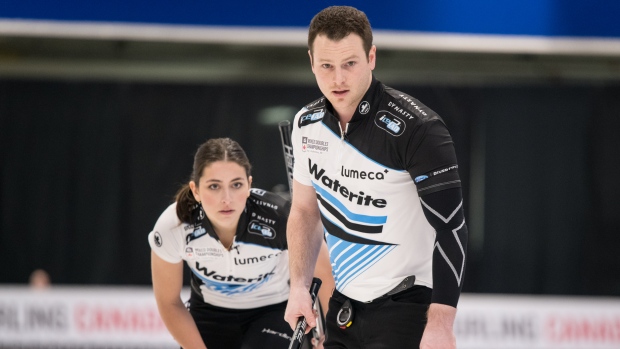
This will be the second go around at this event for teammates Shannon Birchard and Catlin Schneider. The pair finished with a 6-3 record in 2019. Birchard is coming off a third career Scotties championship and will be competing at women’s worlds inside the bubble in May.
Brier champ Brandon Bottcher is back in the bubble and will compete with fiancée Bobbie Sauder. The pair played together in 2019, finishing with a 6-3 record.
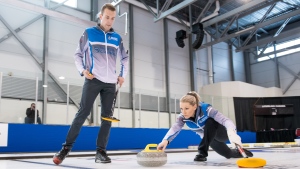
Bottcher played in the 2017 mixed doubles championship with Dana Ferguson, finishing at an impressive 7-2, and the 2018 Olympic Trials, also with Ferguson, going 6-4.
Two-time Scotties champ Val Sweeting has teamed up with mixed doubles rookie Marc Kennedy for this event. Kennedy has never played mixed doubles on the national stage. However, Sweeting has plenty of experience after making the final of the 2018 Mixed Doubles Olympic Trials. She’s competed in one Canadian Mixed Doubles Championship, posting a 5-3 record in 2018 with Tim March.
Emma Miskew and Ryan Fry will play in their second Canadian Mixed Doubles Curling Championship as teammates. They went 7-3 in 2016 in Saskatoon. Fry played mixed doubles with Lawes in 2017 (went 2-5) before teaming up with Miskew again this season.
POOL E
Danielle Schmiemann/John Morris (CMDR)
Ashley Quick/Mike Armstrong (Saskatchewan)
Kaitlyn Lawes/Connor Lawes (CMDR)
Lisa Weagle/John Epping (CTRS)
Dezaray Hawes/Tyler Tardi (NextGen Champ)
Oye-Sem Won/Trevor Bonot (Northern Ontario)
Mackenzie Mitchell/Greg Smith (Newfoundland and Labrador)
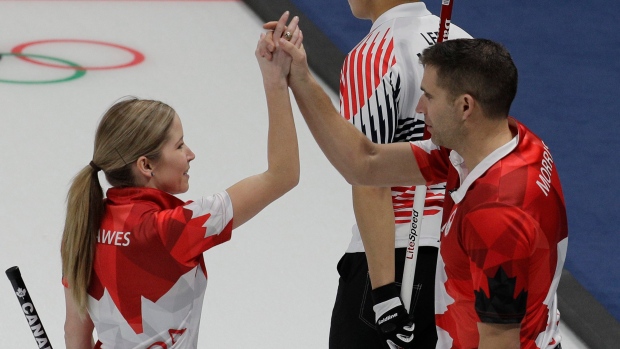
The only curlers who have won Olympic gold medals for mixed doubles will be in the same pool at this year’s championship, but they won’t be teammates.
Morris and Lawes captured gold in South Korea three years ago but have since gone their separate way when it comes to mixed doubles.
Morris will compete with new partner Danielle Schmiemann inside the Calgary bubble as she replaces Rachel Homan, who is staying home while in the late stages of her pregnancy. This will be the fourth Canadian Mixed Doubles Championship for the 42-year-old Morris, most recently finishing with a 6-2 record in 2019 with partner Jolene Campbell. Morris and Homan won silver together at the 2017 event in Saskatoon. Schmiemann, 24, has played in a pair of mixed doubles nationals with Jason Ginter, finishing at 4-3 in 2019 and 4-4 in 2017.
Lawes, on the other hand, is playing with her nephew Connor Lawes. The pair teamed up at the 2014 Canadian Mixed Doubles Championship in Ottawa and finished with a 4-3 record.
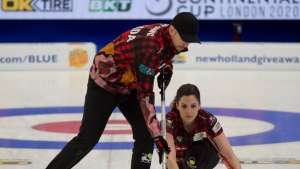
This will be the sixth mixed doubles nationals and first since 2017 for teammates Ashley Quick and Mike Armstrong. Their best result came in 2014 when they won the bronze medal.
The tandem of Lisa Weagle and John Epping will play in their third Canadian Mixed Doubles Championship. They were teammates in 2016 and 2017, posting records of 6-3 and 5-3, respectively.
British Columbia’s Dezaray Hawes and Tyler Tardi are replacing the spot previously filled by Katie and Shawn Cottrill after they declined the invitation. This will be their fourth Canadian Mixed Doubles Championship. They had their best showing in 2019 at 6-2.
